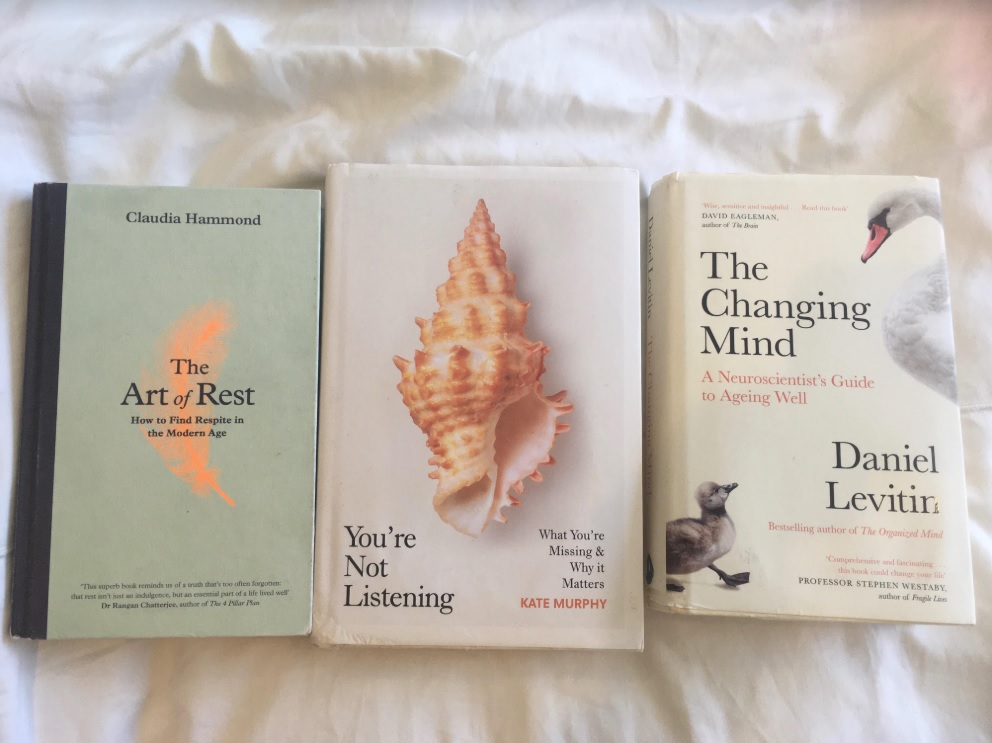After a hectic few months I was lucky enough to get away to Cornwall and Bath on holiday, catching up with friends and family. Whilst there I recharged the best way I know by burying myself in books I’ve been meaning to read for ages.
These 3 books helped me regain perspective after the challenges of lockdown. They offer plenty of practical advice on work life balance, which I haven’t managed as well as I’d have liked to recently. I hope you find them useful too.
The Art of Rest: How to Find Respite in the Modern Age by Claudia Hammond
Originally published pre-lockdown, this book feels so prescient about the difficulties many of us have faced during the pandemic. Rest has been in short supply for many of us as we balance caring responsibilities with Zoom calls and phones pinging constantly with Whats App and Slack alerts. Hammond argues that being busy, rather than taking rest, is highly valued in our culture. Yet none of us can function without respite. In May The Mental Health Foundation launched a study which revealed that many of us were working an extra 28 hours per month during lockdown, leading to worries that we will see burnout amongst the UK workforce.
Hammond examines the science behind how restful activities from baths to walking to spending time in nature help us recharge, whilst admitting that what works for some may not work for others. The book closes with a prescription for rest.
One of my favourite takeaways from this book is to block out downtime. Days of back to back video calls might be efficient but they are also exhausting. They don’t allow for the natural ebb and flow that we all need to allow our brains to process information.
This is an essential read for anyone who needs to improve their health and wellbeing. I’m going to keep this book on my shelf and dip into it whenever I feel the balance between work and family slipping.
You’re Not Listening: What You’re Missing and Why It Matters by Kate Murphy
When was the last time you really listened to someone? Wherever we go now we are confronted with noise. Social media has become a loud, polarised place. Lockdown has meant incessant multitasking. On holiday I sat opposite a family in a cafe who spent an entire meal on their phones, and I’m guilty of glancing at my own devices when I’m with my children. Murphy argues that our always on, content driven culture has damaged the quality of our social interactions, leading to an increase in loneliness and mental health issues.
This book is not an easy read but I learned so much from it. Murphy wants us to focus on listening, not talking. She recommends asking more open-ended questions and embracing silence. She says that if we feel listened to, we feel that we are seen: we are heard and understood. When we end conversations, we should ask, ‘What did I just learn about that person? What was concerning them today? How did they feel about our conversation?’ It’s a really useful structure that I’ll be using to help stay engaged and present when I talk to people. She also talks about the difference between shift responses (taking the conversation back to you) and support responses (which come in various flavours of “Tell me more.”) If your job involves user research this book is invaluable.
Murphy’s book is refreshing and much needed in a noisy world. It’s helped me improve the quality of my interactions with people and I will keep applying her advice to grow relationships in and outside of work.
This Guardian article includes more excellent advice from Murphy.
The Changing Mind: A Neuroscientist’s Guide to Ageing Well by Daniel Levitin
COVID-19 has got us all thinking about mortality and getting older. This is a wonderful, optimistic book which offers advice any of us can apply, regardless of age. Levitin believes that old age doesn’t mean cognitive decline, provided that we look after our health and lifestyle. He advises trying new things and learning fresh problem solving techniques, which can encompass anything from hiking to Sudoku. Exercise, the quality of our relationships with others, getting enough sleep and eating plenty of oily fish are all essential.
If you’re a science buff there is lots in this book for you, but also plenty of good advice if you’re looking to improve your lifestyle as you grow older.What I learned from this book is that staying curious, being open to new ideas and finding meaning through work and our associations with others will help us all have a fulfilling life, whatever age we are.
Which books are helping you recharge this summer?

